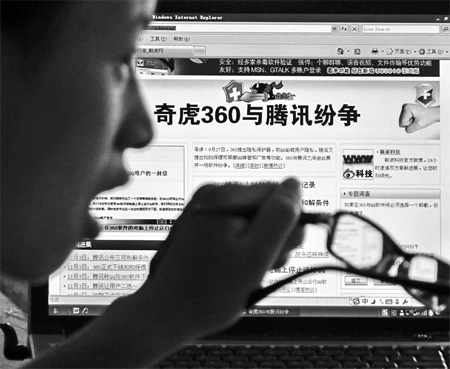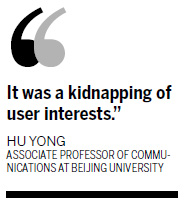Government and Policy
Ministry ends online tug of war
By Wang Xin (China Daily)
Updated: 2010-12-01 08:14
 |
Large Medium Small |
|
 The conflict between Qihoo, maker of 360 antivirus software, and Tencent, creator of instant messaging program QQ, triggered heated discussion among Chinese netizens. [Photo/China Daily] |
Months of very public skirmishes between two Chinese software giants appears to be over after intervention by the Ministry of Industry and Information Technology, but disputes still linger.
| ||||
But the instant messaging program "uses a security module known as QQ housekeeper to scan - not all the data on a computer, but just for those with trojan horse characteristics", Wang Xiaoxia, director of the company's legal department, told China Daily.
"What's more, we don't upload the data and so do not violate user privacy," he said.
Tencent has asked a third party for appraisal as evidence of its innocence.
Only personal information related to identification can be counted as private, according to a China Intellectual Property News quote of Wu Handong, president of Zhongnan University of Economics and Law.
"If QQ just scans files ending with dot-exe (programs in the Windows operating system) it is not infringement on privacy," Wu said.
Even if it does scan documents, it depends on what information is contained in them , he added.
Wang said 360 software misled users to uninstall some QQ programs, which it identified as malicious.
The quarrel became increasingly intense and reached a climax with a public letter from Tencent in early November announcing that QQ and the 360 antivirus program are not compatible - and asked QQ users to take one out.
"It was an emergency," Wang said. "We had no other choice."

He claimed one of Qihoo's products takes advantage of its position as a basic software to probe QQ user log-on information, which "is of commercial value to us and could be used for Qihoo's own messaging system in the future".
"If we did not make a move, our users' data would be stolen by them (Qihoo)."
Yet Zhou Hongwei, Qihoo's board chairman, said his company is not branching out into instant messaging.
"Within our company, some say we should do instant messaging - I told them it's impossible," he said, according to a story in the Southern Metropolis Daily .
The Ministry of Industry and Information Technology began to investigate the fracas in November and criticized the two companies for injuring consumer rights in pursuit of their own economic interests, Xinhua.net reports.
By late November, each company published a letter of regret. Both used the same phrase - claiming a "reverence for users".
In fact both have stated they were fighting for the interest of users rather than their own.
Yet their battle using pop-up windows that called on users to choose sides no doubt damaged many consumers, according to one academic.
"The war was a kidnapping of user interests," Hu Yong, associate professor of communications at Beijing University wrote in his blog.
Whether the government's intervention is needed is another question worth further discussion, Hu said.
The online wrangle has spilled over into serious legal debates.
Lawyers who are also software users have filed a claim against Tencent, which has itself filed a suit against Qihoo. The court is scheduled to begin hearing the case in mid-December.
Yet such quarrels or even legal procedures are better than conspiring to fix prices and markets or getting rid of competitors, Wang Xianlin, professor of law at the Shanghai Jiaotong University, told China Intellectual Property News.
Average consumers have commented that though software is provided for free, user interests still need to be guaranteed.



